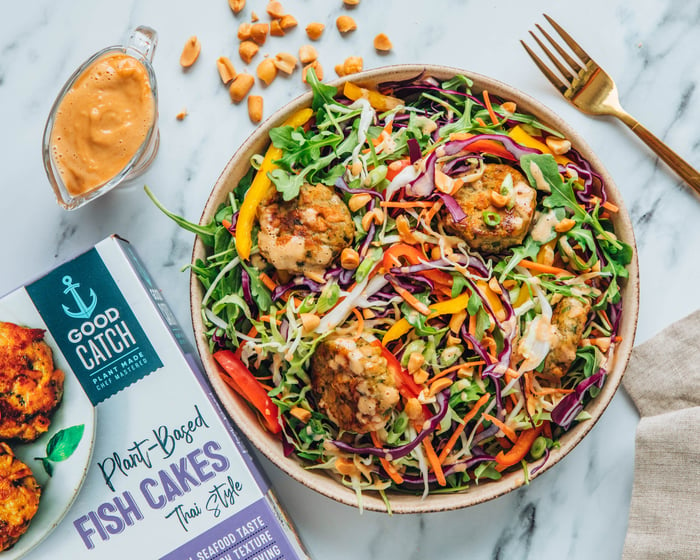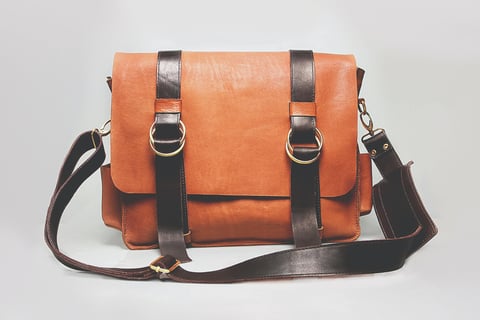 Photo: Good Catch
Photo: Good Catch
The march of companies, both large and small, offering plant-based alternatives to meat continues. As substitutes to beef and chicken have become fairly commonplace, industry names are beginning to shift their focus to the next set of proteins: seafood.
abillion published a report earlier this year, Alternative Seafood: An Ocean of Opportunity, that looks at the growing demand for vegan seafood. For insights into this market, this is a great place to start.
US-based brand Good Catch, has just arrived in Asia, and it’s been enticing diners with its plant-based tuna flakes, fish burger patties, Thai-style fish cakes and crab cakes. These products are created from a six-legume blend of peas, chickpeas, lentils, soy, fava beans and navy beans.
It’s timely as The Food and Agriculture Organization of the United Nations estimates that global seafood consumption will reach 21.5 kilograms per capita by 2030.
At the rate this is going, there may not actually be many fish left in the sea. We speak with Chad Sorno, co-founder and chief culinary officer of Good Catch and Christine Mei, who is the CEO of Gathered Foods, its parent company.
Together, they tell us what they’re doing to help keep as much sea life in the sea.
 Left: Christine Mei | Right: Chad Sorno. Photo: Good Catch
Left: Christine Mei | Right: Chad Sorno. Photo: Good Catch
What prompted you to start the range of plant-based seafood? Was there a defining moment?
Chad: I grew up on the northern East Coast of the US, where seafood is such a part of the food culture. After being vegan for the last 20 years, I missed that experience very much. At the same time, so many plant-based brands had been launched to offer alternatives to dairy, beef, chicken, pork, and other meats, but very little had been done to address seafood.
We saw the need and space to disrupt the seafood industry with a great tasting alternative. Good Catch was created to offer the same texture, flavour, and nutritional value as conventional seafood, without the environmental impact. We call it seafood without sacrifice.
You brand yourselves as chef-driven — what difference does it make really?
Christine: [It’s about] delivering that magical combo of culinary expertise and innovative creativity throughout our entire product portfolio. These two are so delectably intertwined for Good Catch. Who better to understand and know what it takes to delight consumers’ palates than culinary vegan chefs who live, breathe, and experiment with plant-based foods each and every day.
We offer the promise of flavor and textures found in the ocean while protecting the environment and animals. Ultimately, we are providing a craveable plant-based solution which supports ocean health.
 Photo: Good Catch
Photo: Good Catch
You've launched three "categories" of products so far: breaded, patty-style and tuna. Why these categories?
Chad: We started with tuna because fin fish, (tuna, salmon, and other white fish) are the most widely consumed seafood on the planet. Also, the commercial tuna fishing industry is one of the most destructive to our oceans.
We felt we could make the quickest impact there from an environmental standpoint with this being the initial focus. And from there it was a matter of working directly with consumers on panels and in tastings to determine what to launch next. We’re guided by the consumer at every step, along with a good shot of gut instinct.
Who is your target audience? Vegans, vegan-curious, flexitarians etc.
Christine: Everyone — because more and more consumers are becoming flexitarian, as it’s known, and are looking to make better dietary choices. Whether you’re eating our products for the taste, the nutritional benefits, for ethical reasons, or because you may have seafood or shellfish allergies, or want to avoid mercury – Good Catch is a brand for everybody.
What is Good Catch's underlying message, and mission as a business?
Chad: [We want to] create flavorful, plant-based seafood alternatives that offer the taste, texture, and eating experience of seafood without concerns about overfishing, bycatch, or contamination. The only truly sustainable seafood is plant-based seafood because it allows all sea life to remain in the ocean, and off our plates.
You've just launched in Asia — what is the future of the business in terms of market presence?
Christine: We’ve seen how much the plant-based protein market in Asia has rapidly grown in the last few years, with Singapore as one of the fastest growing flexitarian consumer markets there. We knew we wanted to launch in Singapore as it is an important market with an internationally renowned and well-established dining scene, and high consumer awareness of how food makes an environmental and social impact. We have plans to expand to other Asian markets as we ramp up production of our products over the next year.
 Photo: Good Catch
Photo: Good Catch


